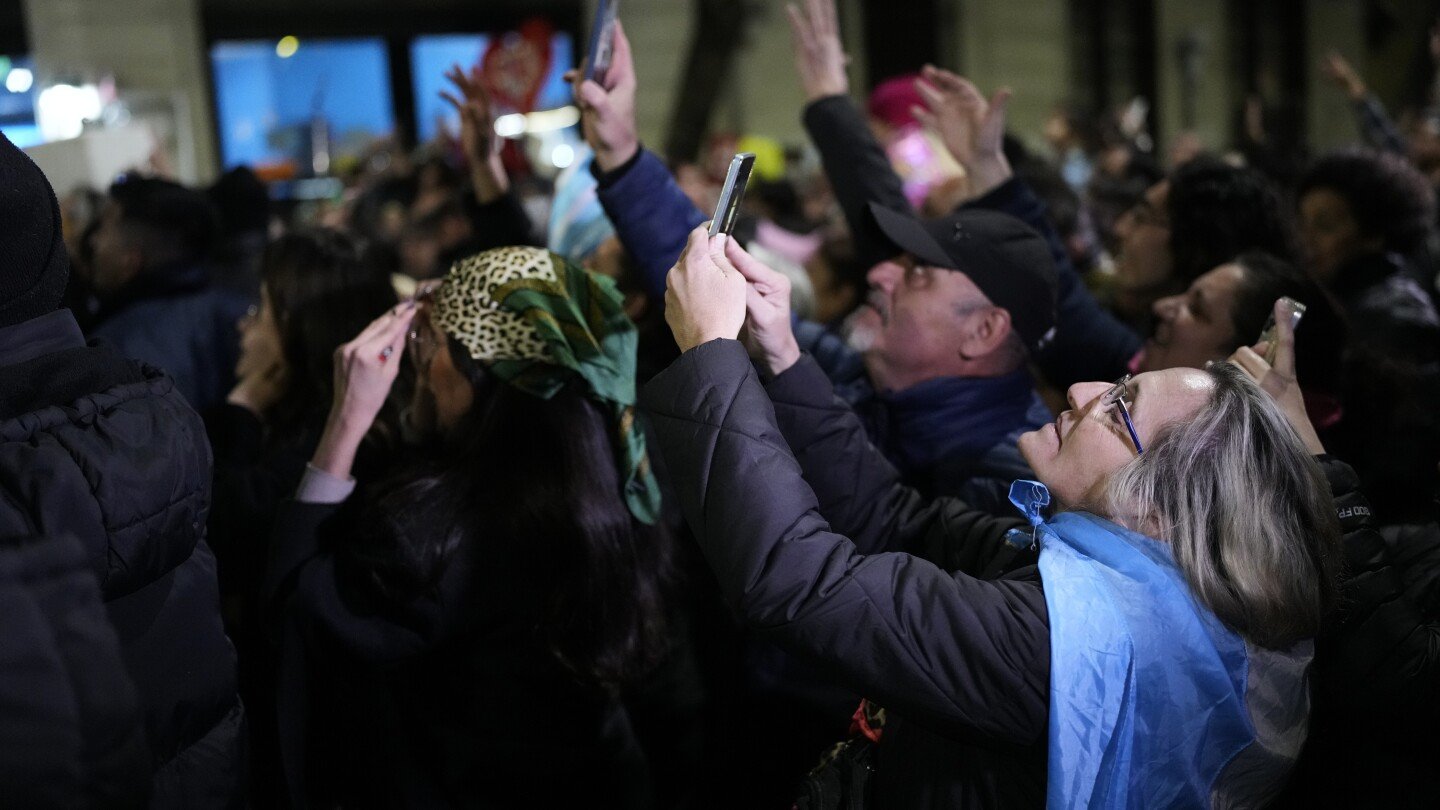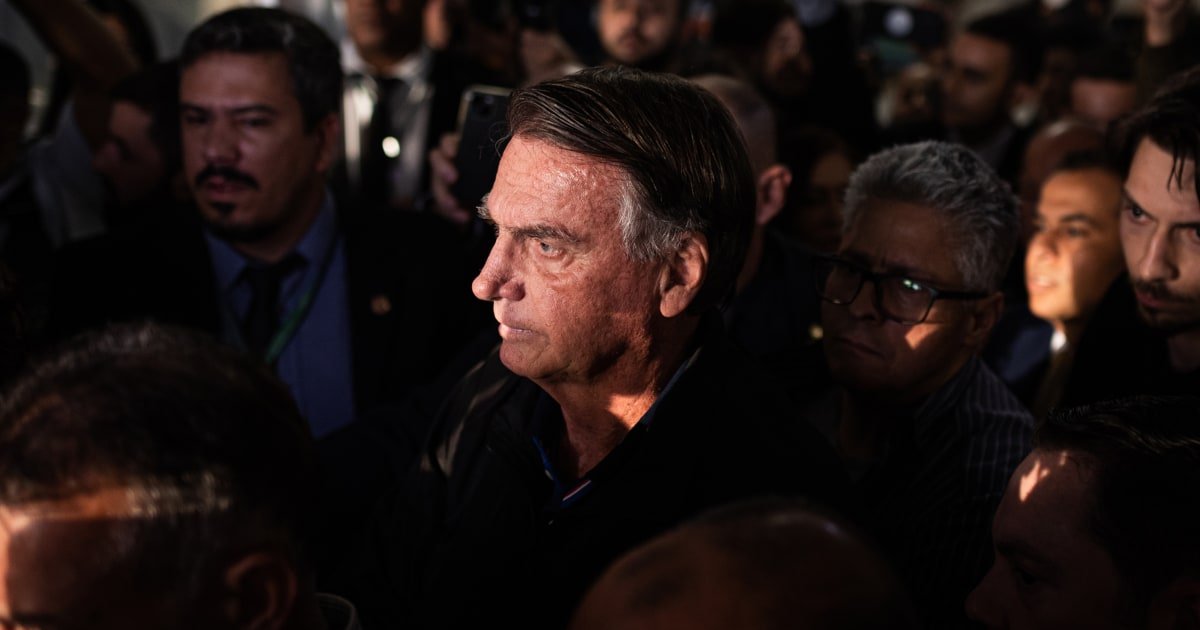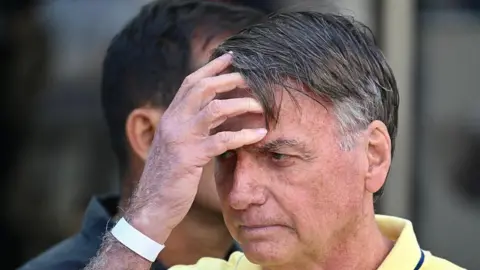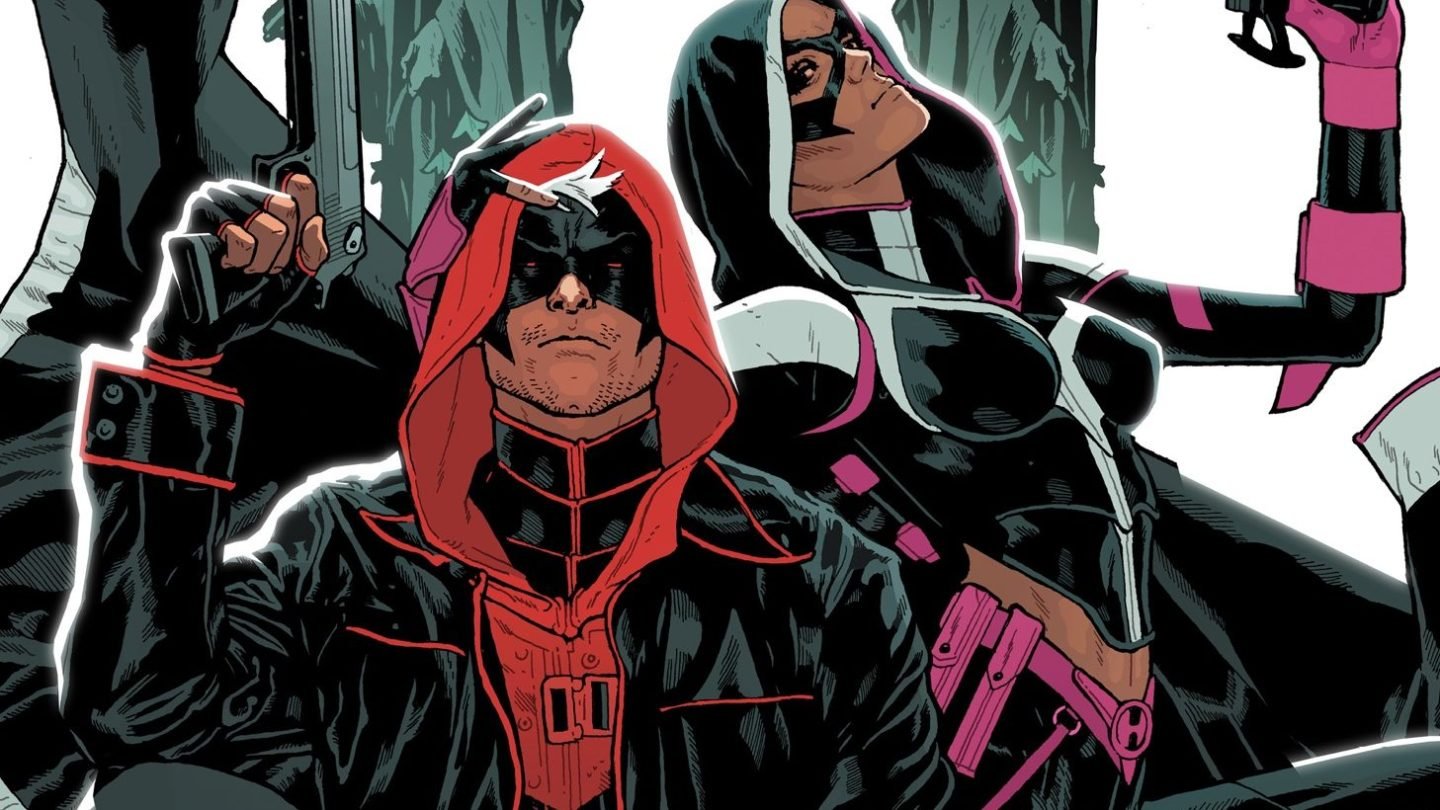Top Stories
Milei dealt a seatback in Argentine local elections

BUENOS AIRES, Argentina (AP) — The party of Argentina’s libertarian President Javier Milei suffered a sweeping setback Sunday in Buenos Aires provincial elections that are viewed as a barometer for how the party will perform in congressional midterms and a key test for the embattled president.
Milei’s recently formed libertarian party lagged with nearly 34% of the vote, with the majority of votes counted. Meanwhile, Peronism, the ideologically flexible populist movement that has held sway in Argentina for decades, lead polls with nearly 47% of the vote.
The results were a significant blow to Milei, who has made radical changes in Argentina perpetually crisis-stricken economy. While the peso has stabilized from previously soaring inflation, harsh scarcity measures have been felt by much of the South American nation’s working class.
Eyes were on the local election because the province is polarized between the political currents and seen as an indication of how the balance is tipping before congressional elections next month.
“This result is a key data point to understand the social mood — where the opposition stands, the state of Peronism and the level of support for the government in Argentina’s most important electoral district,” said Juan Cruz Díaz, the head of Cefeidas Group, a consultancy in Buenos Aires. “While not the main national election in October, it is nonetheless a wake-up call for the government, and how it reacts will be crucial to understanding the evolving political map.”
The leader of the Peronism movement, former President Cristina Fernández de Kirchner, was quick to gloat on social media and take digs at the loose-lipped leader, who has long been compared with President Donald Trump.
“Did you see that Milei?” she wrote on the social media platform X, railing on his economic cuts and controversial statements the president has made. “Get out of your bubble, brother… things are getting heavy.”
The test comes came at a tough time for Milei.
A bribery scandal has rocked the nation, entangling Milei’s politically powerful sister and undercutting the president’s image as a political outsider pitted against the corrupt Peronist elite. Milei denies the allegations that his sister took kickbacks from pharmaceutical contracts.
The opposition-dominated Congress has started to turn against Milei’s harsh cuts to social programs, overriding his veto on raising disability benefits and approving bills that boost scant funding for health care and universities.
Adding to the pressure, Argentina’s economy is shrinking, consumer confidence is falling, unemployment is rising and interest rates are soaring to record highs as the government repeatedly intervenes in the currency market to prop up the peso and hold down inflation in hopes of placating cash-strapped voters.
As a result, Milei hasn’t built up enough foreign currency reserves to assure global markets that he can make good on his promise to transform this nine-time serial defaulter into a normal country capable of servicing its debts.
“Milei has a very strong ideology, and his vision is that the state has to have a minimal impact and investments have to come from the private sector. But that hasn’t materialized yet,” said Ana Iparraguirre, an Argentine political analyst and partner at Washington-based strategy firm GBAO.
Sunday’s vote to elect 69 provincial lawmakers and councilors in dozens of municipalities will not change national policy, nor will it affect the national Congress that holds its midterm elections to renew half of the lower house and a third of the Senate in late October.
But the election has offered foreign investors important clues about whether Milei’s party can gain enough seats in Congress to push through the president’s radical economic overhaul.
Despite the headwinds, it was unclear how things were going to swing until results rolled in Sunday night.
The president has maintained an important level of support by fulfilling his flagship campaign pledge to bring down Argentina’s sky-high inflation rate. And his rivals — whose reckless spending helped deliver the crisis that he inherited — are in disarray.
Former President Fernández, who pulled Peronism to the left during her 2007-2015 tenure and remains its most powerful leader, has been banned from politics for life and placed under house arrest over a corruption conviction.
The party’s future leadership remains uncertain. The movement has struggled to articulate a clear political vision beyond opposition to Milei or economic policy beyond the same patchwork of price controls and cash handouts.
Nonetheless, a sputtering economy and ballooning government corruption scandal has given a jolt of optimism to Peronists in the very place the movement was born in the 1940s.
Top Stories
Brazil’s Bolsonaro sentenced to 27 years after landmark coup plot conviction

BRASILIA — Former Brazilian President Jair Bolsonaro was sentenced on Thursday to 27 years and three months in prison hours after being convicted of plotting a coup to remain in power after losing the 2022 election, dealing a powerful rebuke to one of the world’s most prominent far-right populist leaders.
The conviction ruling by a panel of five justices on Brazil’s Supreme Court, who also agreed on the sentence, made the 70-year-old Bolsonaro the first former president in the country’s history to be convicted for attacking democracy, and drew disapproval from the Trump administration.
“This criminal case is almost a meeting between Brazil and its past, its present and its future,” Justice Carmen Lucia said before her vote to convict Bolsonaro, referring to a history checkered with military coups and attempts to overthrow democracy.
There was ample evidence that Bolsonaro, who is currently under house arrest, acted “with the purpose of eroding democracy and institutions,” she added.
Four of the five judges voted to convict the former president of five crimes: taking part in an armed criminal organization; attempting to violently abolish democracy; organizing a coup; and damaging government property and protected cultural assets.
The conviction of Bolsonaro, a former army captain who never hid his admiration for the military dictatorship that killed hundreds of Brazilians between 1964 and 1985, follows legal condemnations for other far-right leaders this year, including France’s Marine Le Pen and the Philippines’ Rodrigo Duterte.
It may further enrage Bolsonaro‘s close ally U.S. President Donald Trump, who had called the case a “witch hunt” and in retaliation hit Brazil with tariff hikes, sanctions against the presiding judge, and the revocation of visas for most of the high court justices.
Asked about the conviction on Thursday, Trump again praised Bolsonaro, calling the verdict “a terrible thing.”
“I think it’s very bad for Brazil,” he added.
As he watched his father’s conviction from the U.S., Brazilian Congressman Eduardo Bolsonaro told Reuters he expected Trump to consider imposing further sanctions on Brazil and its high court justices.
U.S. Secretary of State Marco Rubio said on X the court had “unjustly ruled,” adding: “The United States will respond accordingly to this witch hunt.”
The verdict was not unanimous, with Justice Luiz Fux on Wednesday breaking with his peers by acquitting the former president of all charges and questioning the court’s jurisdiction.
That single vote could open a path to challenges to the ruling, which could push the trial’s conclusion closer to the October 2026 presidential election. Bolsonaro has repeatedly said he will be a candidate in that election despite being barred from running for office.
From the back benches to the presidency
The conviction of Bolsonaro marks the nadir in his trajectory from the back benches of Congress to his forging of a powerful conservative coalition that tested the limits of the country’s young democratic institutions.
His political journey began in the 1980s on the Rio de Janeiro city council after a brief career as an army paratrooper. He went on to serve nearly three decades as a congressman in Brasilia, where he quickly became known for his defense of authoritarian-era policies.
In one interview, he argued that Brazil would only change “on the day that we break out in civil war here and do the job that the military regime didn’t do: killing 30,000.”
Long dismissed as a fringe player, he later refined his message to play up anti-corruption and pro-family values themes. He found fertile ground as mass protests erupted across Brazil in 2014 and 2015 amid the sprawling “Car Wash” graft scandal that implicated hundreds of politicians — including President Luiz Inacio Lula da Silva, whose own conviction was later annulled.
Anti-establishment anger opened the path for his successful 2018 presidential run, with dozens of far-right and conservative lawmakers elected on his coattails. They have reshaped Congress into an enduring obstacle to Lula’s progressive agenda.
Bolsonaro‘s presidency was marked by intense skepticism of vaccines during the pandemic and an embrace of illegal mining and cattle ranching in the Amazon rainforest, where deforestation climbed.
As he faced a tough reelection campaign against Lula in 2022 — which Lula went on to win – Bolsonaro‘s comments took on an increasingly messianic quality, raising concerns about his willingness to accept the results.
“I have three alternatives for my future: being arrested, killed, or victory,” he said, in remarks to a meeting of evangelical leaders in 2021. “No man on Earth will threaten me.”
In 2023, Brazil’s electoral court barred him from public office until 2030 for venting unfounded claims about Brazil’s electronic voting system.
Lula’s Institutional Relations Minister, Gleisi Hoffmann, said that Bolsonaro‘s conviction “ensures that no one dares again to attack the rule of law or the will of the people as expressed at the ballot box.”
Protecting democracy
Bolsonaro‘s conviction and its durability will be a powerful test for the strategy that Brazil’s highest-ranking judges have adopted to protect the country’s democracy against what they describe as dangerous attacks by the far-right.
Their targets have included social media platforms they accused of spreading disinformation about the electoral system, as well as politicians and activists who have attacked the court. Sending the former president and his allies to jail for planning a coup reflects a culmination of that polarizing strategy.
The cases have largely been led by the commanding figure of Justice Alexandre de Moraes, appointed to the court by a conservative president in 2017, whose hardball approach to Bolsonaro and his allies has been celebrated by the left and denounced by the right as political persecution.
“They want to get me out of the political game next year,” Bolsonaro told Reuters in a recent interview, referring to the 2026 election in which Lula is likely to seek a fourth term. “Without me in the race, Lula could beat anyone.”
The historic significance of the case goes beyond the former president and his movement, said Carlos Fico, a historian who studies Brazil’s military at the Federal University of Rio de Janeiro.
The Supreme Court also ruled to convict seven of Bolsonaro‘s allies, including five military officers.
The verdict marks the first time since Brazil became a republic almost 140 years ago that military officials have been punished for attempting to overthrow democracy.
“The trial is a wake-up call for the armed forces,” Fico said. “They must be realizing that something has changed, given that there was never any punishment before, and now there is.”
Top Stories
Jair Bolsonaro sentenced to 27 years in prison for plotting Brazil coup

Ione WellsSouth America correspondent in Brasília and
Vanessa BuschschlüterBBC News
 EVARISTO SA/AFP via Getty Images
EVARISTO SA/AFP via Getty ImagesThe former president of Brazil, Jair Bolsonaro, has been sentenced to 27 years and three months in prison after being found guilty of plotting a military coup.
A panel of five Supreme Court justices handed down the sentence just hours after they had convicted the former leader.
They ruled he was guilty of leading a conspiracy aimed at keeping him in power after he lost the 2022 election to his left-wing rival, Luiz Inácio Lula da Silva.
Four of the justices found him guilty while one voted to acquit him.
Bolsonaro, who is under house arrest, did not attend the trial but has in the past called it a “witch hunt”.
His words have previously been echoed by US President, Donald Trump, who imposed 50% tariffs on Brazilian goods, framing them as retaliation for Bolsonaro’s prosecution.
Reacting to the guilty verdict, Trump said he found it “very surprising” and compared it to his own experience: “That’s very much like they tried to do with me. But they didn’t get away with it at all.”
US Secretary of State Marco Rubio said that Brazil’s Supreme Court had “unjustly ruled to imprison former President Jair Bolsonaro” and threatened to “respond accordingly to this witch hunt”.
Brazil’s foreign ministry reacted swiftly, posting on X that “threats like the one made today by US Secretary of State Marco Rubio, in a statement that attacks a Brazilian authority and ignores the facts and the compelling evidence on record, will not intimidate our democracy”.
Bolsonaro, who is 70, now faces the prospect of spending the rest of his life in prison.
His lawyers are expected to argue that he should be kept under house arrest instead of being sent to jail.
They will also plead for a lower sentence.
However, they will not be able to appeal against the verdict itself, as that would only have been possible if two out of the five justices had voted to acquit.
Bolsonaro was found guilty of five charges, all relating to his attempt to cling to power after he was beaten in the 2022 election.
But prosecutors said he had started to plot to stay in power long before, proposing a coup to military commanders and sowing unfounded doubts about the electoral system.
They also said that Bolsonaro knew of a plan to assassinate Lula and his vice-presidential running mate, as well as a Supreme Court Justice.
The justices found he had led a conspiracy and also convicted seven of his co-conspirators, including senior military officers. Among them are two former defence ministers, a former spy chief and former security minster.
While the plot failed to enlist enough support from the military to go ahead, it did culminate in the storming of government buildings by Bolsonaro’s supporters on 8 January 2023, the justices found.
Order was quickly restored and more than 1,500 people were arrested.
But, according to Alexandre de Moraes – the justice who oversaw the trial – Brazil had come close to descending into authoritarianism.
“We are slowly forgetting that Brazil almost returned to its 20-year dictatorship because a criminal organisation, comprised of a political group, doesn’t know how to lose elections,” he said before casting his guilty vote.
Brazil’s recent history and the decades it spent under military rule were also invoked by Justice Cármen Lúcia, who cast the decisive third “guilty” vote on Thursday.
She compared the attempted coup to a “virus”, which, if left to fester, can kill the society in which it has taken hold in.
The sole dissenting voice on the five-member panel was Luiz Fux, who argued in an 11-hour speech on Wednesday that the accusations against Jair Bolsonaro were unfounded and voted for him to be acquitted.
But on Thursday, Cármen Lúcia, the only woman on the panel, insisted that Brazil’s democratic order had been at risk and warned that “there was no immunity to authoritarianism”.
Top Stories
DC Cancels ‘Red Hood’ Comic Book Series After Charlie Kirk Shooting

DC has shelved its Red Hood comic book series following writer Gretchen Felker-Martin sharing posts on Bluesky that joked about the shooting of Charlie Kirk, who was killed by an assassin’s bullet Wednesday.
“Hope the bullet’s okay after touching Charlie Kirk,” read one post. “Thoughts and prayers you Nazi bitch,” read another by Felker-Martin. The writer is trans, while Kirk was known for his anti-trans stance. Felker-Martin’s Bluesky account is now deactivated, but those posts were screenshotted and widely spread before DC canceled the series.
“At DC Comics, we place the highest value on our creators and community and affirm the right to peaceful, individual expression of personal viewpoints. Posts or public comments that can be viewed as promoting hostility or violence are inconsistent with DC’s standards of conduct,” a DC spokesperson said in a statement to The Hollywood Reporter.
While the Kirk posts got attention online over the past 24 hours, insiders stress that it was merely the final straw that broke the camel’s back, rather than the sole reason for Red Hood’s cancellation. Any post viewed as promoting hostility or violence would break the company’s social media policy.
As of Thursday afternoon, law enforcement officials were still searching for the shooter behind Kirk’s death. The violent incident sent ripples through the worlds of politics and media, with Comedy Central pulling an episode of South Park that mocked Kirk.
The first issue of Red Hood arrived in comic-book shops on Wednesday, the day outspoken MAGA activist and conservative media figure Kirk was killed while speaking at Utah Valley University. The comic (intended to be part of an ongoing series, with future issues planned for October and November) centered on Jason Todd, a former Robin who has adopted the antihero persona of Red Hood. “Sweat, blood and powder burns. Broken bones and mind control. A city rotted from the inside out,” said Felker-Martin in a statement in June announcing the book. “Jason’s going through hell on the hunt for an enigmatic telepath, and he’s taking us with him. I’m thrilled to be helming this new run of Red Hood with [artist] Jeff Spokes.”
-

 Business2 weeks ago
Business2 weeks agoThe Guardian view on Trump and the Fed: independence is no substitute for accountability | Editorial
-
Tools & Platforms1 month ago
Building Trust in Military AI Starts with Opening the Black Box – War on the Rocks
-

 Ethics & Policy2 months ago
Ethics & Policy2 months agoSDAIA Supports Saudi Arabia’s Leadership in Shaping Global AI Ethics, Policy, and Research – وكالة الأنباء السعودية
-

 Events & Conferences4 months ago
Events & Conferences4 months agoJourney to 1000 models: Scaling Instagram’s recommendation system
-

 Jobs & Careers2 months ago
Jobs & Careers2 months agoMumbai-based Perplexity Alternative Has 60k+ Users Without Funding
-

 Podcasts & Talks2 months ago
Podcasts & Talks2 months agoHappy 4th of July! 🎆 Made with Veo 3 in Gemini
-

 Education2 months ago
Education2 months agoVEX Robotics launches AI-powered classroom robotics system
-

 Education2 months ago
Education2 months agoMacron says UK and France have duty to tackle illegal migration ‘with humanity, solidarity and firmness’ – UK politics live | Politics
-

 Funding & Business2 months ago
Funding & Business2 months agoKayak and Expedia race to build AI travel agents that turn social posts into itineraries
-

 Podcasts & Talks2 months ago
Podcasts & Talks2 months agoOpenAI 🤝 @teamganassi





















